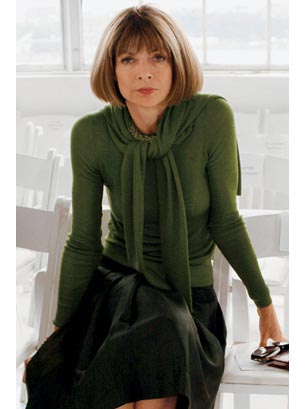
Magazine Maven
She wields considerable influence over American fashion. Runway shows don't start until she arrives. Designers succeed because she anoints them. Trends are created or crippled on her command. But Anna Wintour, editor in chief of Vogue, says she is determined to use her power for good, not evil. Despite her reputation for being icy and inscrutable, despite the severe perfection of her hairstyle and wardrobe, Wintour has taken it upon herself to act as something of a den mother to fledgling designers and worthy causes.
Since taking over the Condé Nast publication in 1988, Wintour has guarded the magazine's No. 1 status among fashion publications — in both circulation and prestige. But she has brought the magazine's tone down from its Olympian heights, acknowledging that trends are as likely to start from the ground as be decreed from on high and offering tips on how to get runway looks for real-wage prices. Part of this is out of necessity: to maintain a high circulation, she must appeal to as broad an audience as possible. But she has proved herself committed to discovering and fostering new talent. In 2003, for example, she joined the Council of Fashion Designers of America in creating a fund that each year will bestow money and guidance on at least two emerging designers.
From her perch, she has also taken on social issues and urged others in the industry to do the same. "I have always believed that it is important to understand Vogue's mission in broad and socially responsible terms," she says. Last year she got Vogue to contribute money to open beauty salons in Kabul, creating jobs for newly liberated Afghan women; a story on the project ran in the magazine. After 9/11, she organized the sale of specially designed T shirts to benefit a Twin Towers fund and spearheaded a p.r. campaign to get people shopping again.